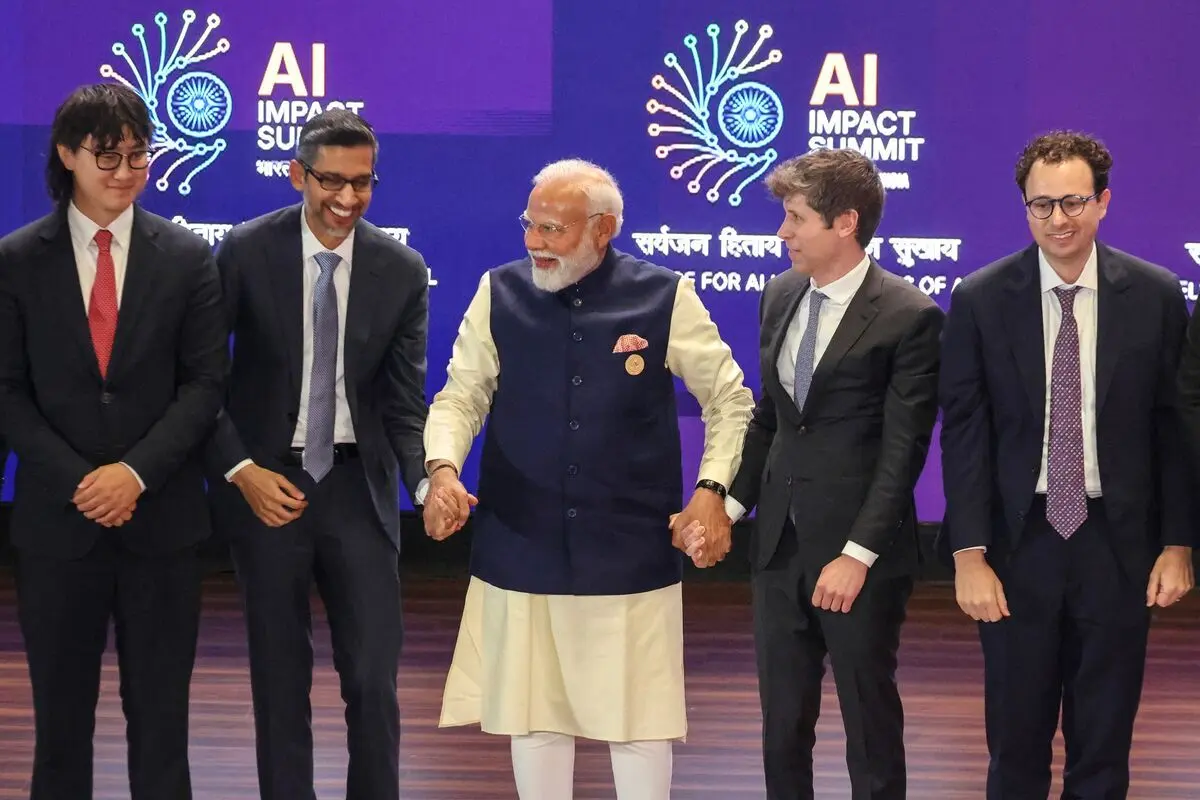G20 Troika Leaders Endorse Digital Public Infrastructure and AI for Inclusive Development
2 Sources
2 Sources
[1]
India, Brazil, South Africa agree to use digital public infrastructure, AI and data for governance
Leaders from the G20 Troika - India, Brazil, and South Africa - released a joint declaration emphasizing the role of Digital Public Infrastructure (DPI) and AI in achieving inclusive and sustainable development. They highlighted the potential of these technologies to transform lives, create jobs, and improve healthcare and education outcomes, particularly in the context of sluggish global economic growth.Leaders from the G20 Troika - India, Brazil and South Africa - unveiled a landmark joint declaration on Digital Public Infrastructure (DPI), Artificial Intelligence and data for governance amid global economic growth at just over 3%, its lowest rate since the turn of the century. Accelerating progress towards the SDGs requires inclusive digital transformation. The experiences of several G20 countries have demonstrated that well-designed DPI augmented by AI can enable the use of data for development, creating new jobs and delivering better health and education outcomes, the statement read. "Their adoption by G20 countries more widely has the potential to radically transform the lives of citizens, thereby renewing their faith in vibrant democratic principles. In this context, we recall the adoption of Global Digital Compact at the UN Summit of the Future. We also welcome the Global DPI Summit held in Egypt in 2024," according to the joint declaration. The benefits of growth with job creation can only be unlocked when technological systems focus on each citizen, enabling small and large businesses to connect to them to improve the livelihood of families and neighbourhoods. This happens when such systems are inclusive, development-oriented, secure and designed to respect the privacy of individuals, the declaration pointed out.
[2]
India, Brazil and South Africa agrees to use digital public infra and AI to bridge global inequality gap
This declaration, endorsed by several G20 countries, guest nations, and international organisations, underscores the potential of technology to bridge global inequalities and accelerate progress toward the Sustainable Development Goals (SDGs).Amid global economic growth stagnating at just over 3 per cent--its lowest rate since the turn of the century--leaders from the G20 Troika, comprising India, Brazil, and South Africa, unveiled a visionary joint declaration on digital public infrastructure (DPI), artificial intelligence (AI), and data for governance. According to the PMO, this declaration, endorsed by several G20 countries, guest nations, and international organisations, underscores the potential of technology to bridge global inequalities and accelerate progress toward the Sustainable Development Goals (SDGs). The communique highlighted the pivotal role of well-designed DPI and AI in fostering equitable digital transformation. Drawing on successful experiences in G20 countries, the leaders emphasised that technology, if inclusively deployed, could create new jobs, enhance health and education outcomes, and rebuild citizens' trust in democratic governance. The declaration stated that the technology is advancing at a dizzying pace. If equitably deployed, it offers us a historic opportunity to raise growth, reduce inequality, and take a giant step towards achieving the SDGs. Welcoming global initiatives such as the Global Digital Compact adopted at the UN Summit of the Future and the 2024 Global DPI Summit in Cairo, Egypt, the leaders stressed that inclusive, development-orientated, and secure technological systems are crucial for empowering citizens and businesses alike. The declaration proposed that digital systems adhere to foundational principles--open, modular, interoperable, and scalable--to ensure inclusivity and adaptability to evolving national needs. These systems must focus on citizens, enabling businesses of all sizes to connect seamlessly and enhance livelihoods at the grassroots level. The communique also called for a technology-neutral approach, fostering competition and innovation, reducing digital economic asymmetries, and ensuring fair deployment of DPI and AI. The leaders emphasized the need for robust data governance frameworks to safeguard privacy, security, and intellectual property rights while ensuring fair market practices. Transparent and equitable data management principles, they argued, are central to building trust in technological systems. The declaration asserted that trust is the cornerstone of flourishing democracies, and the same applies to technological systems. Transparency, safeguards, and fairness are indispensable. Recognizing the transformative potential of AI, the communique urged the development of foundational and frontier AI models trained on diverse and representative datasets.
Share
Share
Copy Link
Leaders from India, Brazil, and South Africa release a joint declaration emphasizing the role of Digital Public Infrastructure (DPI) and AI in achieving sustainable development and bridging global inequalities.

G20 Troika's Vision for Digital Transformation
In a landmark move, leaders from the G20 Troika - India, Brazil, and South Africa - have unveiled a joint declaration on Digital Public Infrastructure (DPI), Artificial Intelligence (AI), and data governance. This initiative comes at a crucial time when global economic growth has slowed to just over 3%, its lowest rate since the turn of the century
1
2
.Leveraging Technology for Sustainable Development
The declaration emphasizes the potential of DPI and AI to accelerate progress towards the Sustainable Development Goals (SDGs). Drawing from successful experiences in G20 countries, the leaders highlight how well-designed technological systems can create new jobs, improve health and education outcomes, and transform citizens' lives
1
.Principles for Inclusive Digital Infrastructure
The Troika leaders propose that digital systems should adhere to foundational principles of being open, modular, interoperable, and scalable. This approach aims to ensure inclusivity and adaptability to evolving national needs
2
. The declaration stresses the importance of citizen-centric systems that enable businesses of all sizes to connect seamlessly, thereby improving livelihoods at the grassroots level1
.AI and Data Governance
Recognizing the transformative potential of AI, the communique calls for the development of foundational and frontier AI models trained on diverse and representative datasets
2
. The leaders also emphasize the need for robust data governance frameworks to safeguard privacy, security, and intellectual property rights while ensuring fair market practices2
.Global Initiatives and Collaboration
The declaration welcomes global initiatives such as the Global Digital Compact adopted at the UN Summit of the Future and the 2024 Global DPI Summit in Cairo, Egypt
1
. This alignment with international efforts underscores the G20 Troika's commitment to fostering global cooperation in digital transformation.Related Stories
Bridging Global Inequalities
A key focus of the declaration is the potential of technology to bridge global inequalities. The leaders argue that if equitably deployed, these technological advancements offer a historic opportunity to raise growth, reduce inequality, and make significant progress towards achieving the SDGs
2
.Trust and Transparency in Technological Systems
The communique asserts that trust is fundamental to both flourishing democracies and technological systems. It calls for transparency, safeguards, and fairness in the deployment of DPI and AI
2
. The leaders stress that these principles are indispensable for building and maintaining public trust in digital infrastructure.Economic Impact and Job Creation
The declaration highlights the potential economic benefits of inclusive digital transformation. It suggests that when technological systems focus on individual citizens, they can enable both small and large businesses to improve the livelihoods of families and communities
1
. This citizen-centric approach is seen as key to unlocking growth and job creation.References
Summarized by
Navi
[1]
Related Stories
India Advocates for Global Adoption of Digital Public Infrastructure at G20
16 Jul 2024

BRICS Leaders Call for Data Protection and Fair Compensation in AI Governance
07 Jul 2025•Policy and Regulation

Modi pitches India as affordable AI hub at summit, drawing $200 billion in investments
17 Feb 2026•Business and Economy

Recent Highlights
1
Samsung unveils Galaxy S26 lineup with Privacy Display tech and expanded AI capabilities
Technology

2
Anthropic refuses Pentagon's ultimatum over AI use in mass surveillance and autonomous weapons
Policy and Regulation

3
AI models deploy nuclear weapons in 95% of war games, raising alarm over military use
Science and Research





